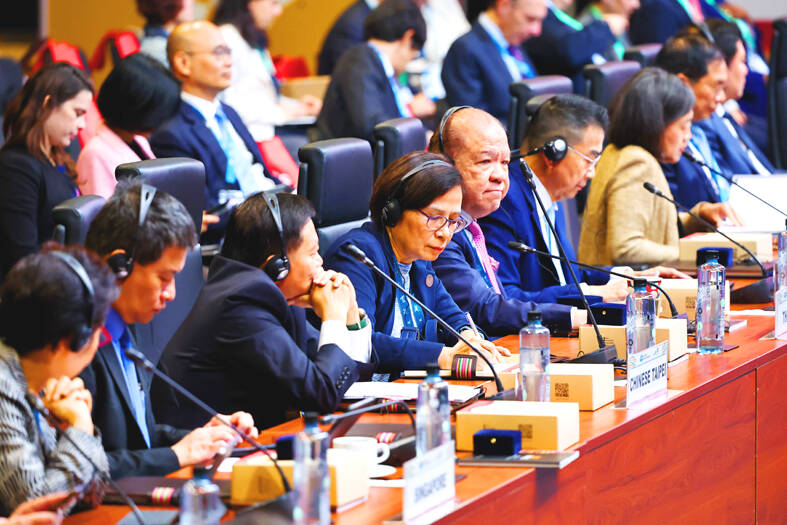Taiwan’s chief trade negotiator, Minister Without Portfolio Jenni Yang (楊珍妮), on Thursday said that the nation would continue advancing a trade deal with the US under the incoming administration of US president-elect Donald Trump.
Taiwan remains optimistic about furthering the US-Taiwan Initiative on 21st-Century Trade, despite a pause in negotiations due to the transition to the new administration, Yang told reporters at the APEC summit in Lima.
Taiwan is preparing to review regulations before entering a new round of negotiations, which would cover issues including agriculture, labor and the environment, she said.

Photo: CNA
“These issues are inherently difficult to negotiate,” she said, adding that hopefully Trump’s administration would continue discussions on the second phase of talks following the signing of the first agreement by both sides in June last year.
The initial agreement, expected to take effect by the end of this year, includes customs administration and trade facilitation, good regulatory practices, policies to combat corruption, and promotion of small and medium-sized enterprises.
However, concerns have arisen regarding Taiwan’s trade relationship with the US after Trump, whose rhetoric suggests opposition to global trade, won the US presidential election on Nov. 5.
Yang, who is part of Taiwan’s APEC delegation, met with US Trade Representative Katherine Tai (戴琪) on the sidelines of the APEC Ministerial Meeting on Wednesday.
A statement issued by Tai’s office said that both sides highlighted the importance of economic and trade ties during the meeting.
Yang and Tai also discussed progress made through the US-Taiwan Initiative on 21st-Century Trade, as well as their work together at the APEC forum and other multilateral organizations, including the WTO, the statement said.
Meanwhile, Taiwan’s envoy to APEC, Lin Hsin-i (林信義), and US Secretary of State Antony Blinken held talks in Lima on Thursday ahead of the bloc’s Economic Leaders’ Meeting.
Lin arrived in the Peruvian capital on Wednesday with the Taiwanese delegation, the Ministry of Foreign Affairs said.
The two discussed ways to continue improving the bilateral partnership, and ensuring regional peace and stability, while exchanging views on issues such as promoting the development of Taiwan’s diplomatic allies in the region, the ministry said.
Blinken posted a photograph of the two shaking hands on social media and wrote that their talks touched upon “our growing economic relationship and our enduring shared commitment to foster an open, dynamic and peaceful Indo-Pacific.”
Lin — chairman of Taiwania Capital Management Corp (台杉投資管理), a government-funded venture capital firm, and a senior adviser to President William Lai (賴清德) — was to take part in the APEC Economic Leaders’ Meeting yesterday and today as Taiwan’s envoy, a role he has had before.
The meeting was expected to be attended by US President Joe Biden, Chinese President Xi Jinping (習近平) and Japanese Prime Minister Shigeru Ishiba, among other heads of government.
APEC is one of the few inter-governmental pacts in which Taiwan has full membership, but it still sends special envoys in place of its president to the annual event due to pressure from China.

CALL FOR SUPPORT: President William Lai called on lawmakers across party lines to ensure the livelihood of Taiwanese and that national security is protected President William Lai (賴清德) yesterday called for bipartisan support for Taiwan’s investment in self-defense capabilities at the christening and launch of two coast guard vessels at CSBC Corp, Taiwan’s (台灣國際造船) shipyard in Kaohsiung. The Taipei (台北) is the fourth and final ship of the Chiayi-class offshore patrol vessels, and the Siraya (西拉雅) is the Coast Guard Administration’s (CGA) first-ever ocean patrol vessel, the government said. The Taipei is the fourth and final ship of the Chiayi-class offshore patrol vessels with a displacement of about 4,000 tonnes, Lai said. This ship class was ordered as a result of former president Tsai Ing-wen’s (蔡英文) 2018

‘SECRETS’: While saying China would not attack during his presidency, Donald Trump declined to say how Washington would respond if Beijing were to take military action US President Donald Trump said that China would not take military action against Taiwan while he is president, as the Chinese leaders “know the consequences.” Trump made the statement during an interview on CBS’ 60 Minutes program that aired on Sunday, a few days after his meeting with Chinese President Xi Jinping (習近平) in South Korea. “He [Xi] has openly said, and his people have openly said at meetings, ‘we would never do anything while President Trump is president,’ because they know the consequences,” Trump said in the interview. However, he repeatedly declined to say exactly how Washington would respond in

WARFARE: All sectors of society should recognize, unite, and collectively resist and condemn Beijing’s cross-border suppression, MAC Minister Chiu Chui-cheng said The number of Taiwanese detained because of legal affairs by Chinese authorities has tripled this year, as Beijing intensified its intimidation and division of Taiwanese by combining lawfare and cognitive warfare, the Mainland Affairs Council (MAC) said yesterday. MAC Minister Chiu Chui-cheng (邱垂正) made the statement in response to questions by Democratic Progressive Party (DPP) Legislator Puma Shen (沈柏洋) about the government’s response to counter Chinese public opinion warfare, lawfare and psychological warfare. Shen said he is also being investigated by China for promoting “Taiwanese independence.” He was referring to a report published on Tuesday last week by China’s state-run Xinhua news agency,

‘ADDITIONAL CONDITION’: Taiwan will work with like-minded countries to protect its right to participate in next year’s meeting, the foreign ministry said The US will “continue to press China for security arrangements and protocols that safeguard all participants when attending APEC meetings in China,” a US Department of State spokesperson said yesterday, after Beijing suggested that members must adhere to its “one China principle” to participate. “The United States insists on the full and equal participation of all APEC member economies — including Taiwan — consistent with APEC’s guidelines, rules and established practice, as affirmed by China in its offer to host in 2026,” the unnamed spokesperson said in response to media queries about China putting a “one China” principle condition on Taiwan’s